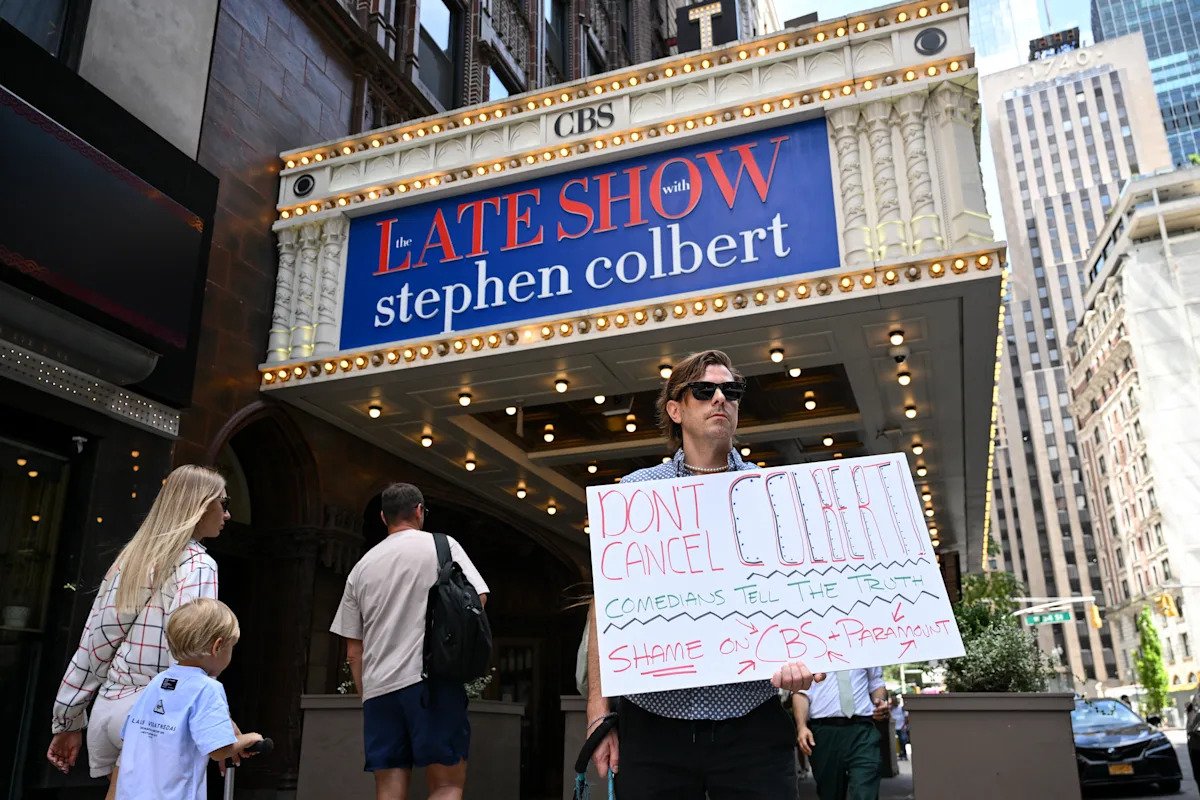Breaking News
Americans think Paramount is canceling ‘The Late Show with Stephen Colbert’ because of politics — and they don’t approve

More Americans disapprove (40%) than approve (33%) of Paramount’s controversial decision earlier this month to cancel CBS’s long-running late-night program with host Stephen Colbert, according to a new Yahoo/YouGov poll.
And while CBS has claimed the decision was “purely … financial” — adding that it was “not related in any way to the show’s performance, content or other matters happening at Paramount” — more Americans believe that politics rather than money was the real reason behind it.
The survey of 1,729 U.S. adults was conducted in the immediate aftermath of Paramount’s Late Show announcement, from July 24 to July 28 — a period that coincided with the Federal Communications Commission (FCC) finally agreeing to sign off on the company’s proposed $8 billion mega-merger with the Hollywood studio Skydance.
Colbert is a sharp critic of President Trump, and skeptics have accused Paramount of canceling the Late Show not because late-night talk shows are losing money but because the company wanted to appease the Trump administration and get its Skydance deal over the line.
Last October, Trump sued Paramount for the way CBS’s 60 Minutes program edited an interview with his Democratic rival, Kamala Harris — and earlier this month, Paramount decided to settle with Trump and pay $16 million to his future presidential library, even though several legal experts said the case was frivolous.
Colbert — who is scheduled to keep hosting the Late Show until it goes dark next May — mocked the settlement on-air, calling it a “big fat bribe.”
“As someone who has always been a proud employee of this network, I’m offended, and I don’t know if anything will ever repair my trust in this company,” Colbert told his audience. “But just taking a stab at it, I’d say $16 million would help.”
The new Yahoo/YouGov poll shows that more Americans agree with Colbert’s theory of why his show was canceled than agree with other, more ‘purely financial’ explanations. When asked why CBS and Paramount are canceling the Late Show — and instructed to select all the reasons that apply — the share who select “Paramount is trying to curry favor with the Trump administration” (37%) and “Stephen Colbert is too critical of Donald Trump” (36%) is greater than the share who select “the Late Show is losing money (32%), “the Late Show is losing viewers” (30%) and “the late-night format is losing relevance” (26%).
Partisan preferences are clearly playing a role in the reaction to the Late Show’s demise. Far more Americans think Colbert is liberal (53%) than think he’s moderate (10%) or conservative (3%), and Democrats (72%) are six times more likely to disapprove of the decision than Republicans (12%).
Still, there is no consensus that Colbert has gone overboard politically. In fact, more Americans (35%) say he is “about right” politically than say he’s “too political” (28%). And more also favor (46%) than oppose (31%) “late-night talk show hosts getting involved in politics by speaking out on political issues.”
That might help explain why a majority of Americans still say they watch Colbert’s content — either “always” (5%), “occasionally” (21%) or when they “see clips online” (27%). The rest (47%) say they never watch Colbert.
Finally, when Americans are asked to select up to three of their favorite late-night talk show hosts, Colbert (25%) ties Jimmy Fallon (25%) for first place, with Jimmy Kimmel (22%), Jon Stewart (19%), John Oliver (11%) Seth Meyers (7%), Bill Maher (7%), Andy Cohen (3%) and Taylor Tomlinson (2%) trailing behind them.
__________________
The Yahoo survey was conducted by YouGov using a nationally representative sample of 1,729 U.S. adults interviewed online from July 24 to 28, 2025. The sample was weighted according to gender, age, race, education, 2024 election turnout and presidential vote, party identification and current voter registration status. Demographic weighting targets come from the 2019 American Community Survey. Party identification is weighted to the estimated distribution at the time of the election (31% Democratic, 32% Republican). Respondents were selected from YouGov’s opt-in panel to be representative of all U.S. adults. The margin of error is approximately 3.1%.
